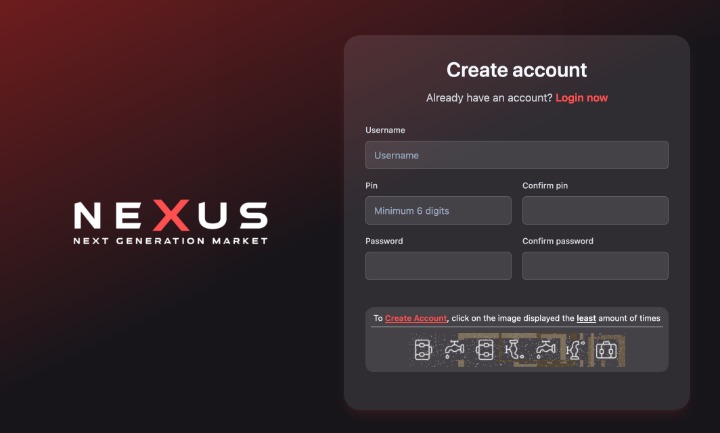Nexus Market Darknet Overview
The Nexus Market Darknet represents a notable segment within the underground online marketplace ecosystem, providing a platform for various anonymous transactions. Known for its emphasis on privacy and security, it serves as a hub where buyers and sellers can engage in discreet exchanges across a range of products and services. As one of the prominent marketplaces operating within the darknet, the Nexus Market is often studied to understand the broader dynamics of illicit online commerce. For those interested in exploring more about this covert marketplace, additional information can be found on dedicated platforms that host anonymized markets such as Nexus Market.
Introduction to Nexus Market
- The NEXUS Market Team understands that while most users are honest, there may always be a few who might misuse the platform’s anonymity.
- Where others chase excess—weapons, leaks, chaos—NEXUS hones silence, a choice etched in its forging.
- If there’s an issue with your order, first try contacting the vendor directly.
The Nexus Market Darknet is a clandestine online marketplace operating within hidden networks that facilitate anonymous transactions and exchanges. It is renowned for providing a range of illicit goods and services, often catering to users seeking privacy beyond conventional e-commerce platforms. The market has gained notoriety for its secure environment, designed to protect both buyers and sellers from detection by authorities.
At its core, the Nexus Market Darknet utilizes advanced encryption technologies and anonymizing tools to ensure that all activities remain concealed. This platform typically features a variety of product categories, including digital currencies, forged documents, and other contraband items. Users participate in the marketplace through specialized software that maintains their anonymity and safeguards their identity.
In terms of structure, Nexus Market Darknet operates with a reputation system, user ratings, and escrow services to maintain trust among participants. Its user interface is designed to resemble familiar online shopping experiences, yet it operates entirely within the dark web ecosystem. Such features help in attracting a larger user base while maintaining rigorous security protocols.
- Secure anonymous transactions that protect user identity
- Wide range of illicit goods and services
- Reputation and escrow systems to ensure trustworthiness
- Use of encryption and anonymizing tools to prevent detection
- An active community of users engaged in various illegal activities
Overall, the Nexus Market Darknet exemplifies the sophistication and persistent evolution of underground markets, emphasizing the importance of cybersecurity and vigilance for law enforcement agencies and users alike. Its existence underlines how digital platforms can be leveraged for illicit purposes, posing ongoing challenges for regulation and safety online.
Historical Development and Origins
The Nexus Market Darknet has emerged as a notable platform within the clandestine online economy, offering a range of illicit goods and services to its users. Operating on the Tor network, it provides an environment where anonymity and security are prioritized, attracting individuals seeking to buy and sell illegal products without revealing their identities. As a part of the broader dark web ecosystem, Nexus Market has gained attention for its user-friendly interface and diverse offerings, which include contraband, hacking tools, and other illicit commodities.
The origins of the Nexus Market Darknet can be traced back to the early 2010s when the concept of dark web marketplaces started to proliferate. Initially built as underground forums and basic anonymous trading spaces, these platforms gradually evolved into more sophisticated marketplaces. Nexus Market was established amidst this evolution as a response to the increasing demand for secure and discreet transaction environments. Over time, it developed features such as escrow services, multiple vendor ratings, and encryption protocols that enhanced user trust and safety.
The historical development of Nexus Market reflects the broader trajectory of darknet marketplaces, where innovation and adaptability have played crucial roles. Its founders sought to differentiate it from other platforms through better security measures, a wider product scope, and improved customer support. The marketplace has also faced law enforcement challenges and platform shutdowns, which have influenced its operational strategies and structural changes. Despite these hurdles, Nexus Market remains a significant node within the dark web, illustrating both the resilience and persistent appeal of such clandestine marketplaces for illicit trade.
Structure and Operation
The structure and operation of darknet marketplaces are complex systems designed to facilitate anonymous transactions and access to various goods and services. These platforms often utilize specialized protocols and networks to ensure security and privacy for both buyers and sellers. Understanding how these marketplaces are organized helps in grasping their functionality and the risks involved. One example of such a marketplace is the nexus market darknet, which employs advanced security measures to maintain user anonymity. Users can access a range of products through encrypted channels, often using Tor or similar networks, to browse and conduct transactions safely. To explore more about Nexus Market darknet and its operational framework, you can visit this related resource.
Platform Architecture
The structure and operation of darknet marketplaces, such as Nexus Market darknet, are designed to prioritize user anonymity and secure transactions. These platforms typically utilize decentralization to distribute data across multiple servers, making it difficult for authorities to shut down the marketplace. They often operate on hidden networks, accessed through specialized software that ensures encrypted communication channels.
Platform architecture in darknet markets relies heavily on advanced encryption protocols and anonymizing technologies. Most commonly, they are built on robust, scalable frameworks that support a wide range of functionalities including product listings, escrow services, and user messaging. These systems are designed to be resilient against takedowns and tampering, ensuring continuous operation and access for users involved in illicit trades.
Operational security is maintained through the use of pseudonymous accounts, encrypted communications, and strict vetting procedures for vendors. The marketplace’s backend infrastructure often includes distributed hosting, layered obfuscation techniques, and secure payment integrations to minimize traceability. The intricate combination of these elements allows platforms like Nexus Market darknet to sustain their operations in the challenging environment of the darknet ecosystem.
Types of Goods and Services Offered
Nexus Market Darknet is a prominent online marketplace operating within the hidden layers of the internet, known as the darknet. Its structure is typically organized into various categories and sections to facilitate user navigation and transaction security. These marketplaces are often designed with multiple layers of encryption and anonymizing technologies to protect both buyers and sellers, ensuring transactions remain confidential and protected from identification.
Operationally, Nexus Market Darknet functions through a decentralized platform that relies heavily on cryptocurrencies for transactions, primarily to maintain anonymity. The marketplace uses secure protocols and measures such as multi-signature wallets and escrow services to enhance safety. Regular maintenance and updates are crucial to evade law enforcement detection and cyber threats, making its operation complex and requiring a dedicated team of administrators and moderators to oversee activities.
Regarding the types of goods and services offered, Nexus Market Darknet generally provides a wide range of products that can include illegal items such as drugs, firearms, forged documents, and hacking tools. Additionally, it may host services like hacking, account hacking, and even illicit data trades. Although some legitimate and gray-market services are sometimes available, the primary focus tends to be on high-risk and illegal commodities. The marketplace’s design emphasizes discretion, and transactions are carefully structured to conceal identities, ensuring a level of operational anonymity essential for both users and administrators.
User and Vendor Community
In the digital landscape, the User and Vendor Community plays a crucial role in shaping secure and functional online marketplaces. These communities foster collaboration, trust, and exchange of valuable information among participants, especially within the context of the darknet. Engaging with such communities can provide insights into the workings of platforms like nexus market darknet, which is known for its diverse offerings and complex ecosystem. Understanding the dynamics of these communities is essential for navigating the intricacies of darknet markets safely and effectively. For those interested in exploring further, resources such as community forums and specialized marketplaces can be valuable sources of knowledge and tools.
Types of Participants
The darknet marketplace scene, particularly platforms like Nexus Market Darknet, revolves around a diverse community of users and vendors engaging in a variety of transactions. These communities are characterized by their emphasis on privacy and anonymity, facilitating interactions that often involve products and services not available through traditional channels. Participants in this ecosystem typically fall into two main categories: users and vendors, each playing a crucial role in the functioning of the marketplace.
Users of darknet marketplaces are individuals seeking access to a wide array of goods and services that may be restricted or illegal in certain jurisdictions. They often prioritize anonymity and security, employing tools such as Tor and VPNs to protect their identities. These participants may browse listings, communicate with vendors, and complete transactions while maintaining confidentiality. The user community is diverse, ranging from those interested in legal but hard-to-acquire items to individuals engaging in the exchange of illicit commodities.
Vendors form the second essential group within these communities. They are responsible for listing products or services, managing customer inquiries, and fulfilling orders. Vendors on platforms like Nexus Market Darknet often operate under pseudonyms and utilize encrypted communication channels to ensure their safety and anonymity. Successful vendors build reputations through reviews and consistent service, which are vital for attracting new customers in a competitive environment. This trust mechanism is fundamental in sustaining the marketplace, especially given the illicit nature of many transactions.
The interactions between users and vendors in darknet markets are shaped by mutual needs for discretion and security. Both parties leverage various technological tools and community norms to mitigate risks associated with illegal activities. As these markets evolve, so do the roles and behaviors of their participants, with a continuous focus on protecting identities and ensuring safe exchanges. Understanding the dynamics of these communities provides insight into the operational frameworks of platforms like Nexus Market Darknet and the broader darknet economy.
Vendor Reputation and Verification
The nexus market darknet operates as a private, often hidden marketplace where users and vendors interact outside the purview of traditional online channels. In such environments, establishing trust and credibility is essential for both parties, making the community aspect a crucial component of the marketplace’s ecosystem. A strong user and vendor community helps foster a sense of security and reliability, encouraging ongoing participation and transactions.
Vendor reputation within the nexus market darknet is typically built through a combination of transaction history, quality of products or services, and feedback from previous clients. Reputation systems may involve ratings, reviews, and verified transaction records that help buyers assess the trustworthiness of vendors before making purchases. Maintaining a good reputation is vital for vendors to attract new customers and succeed in the competitive environment of the darknet market.
Verification processes play a significant role in ensuring secure and legitimate exchanges within the community. Vendors often undergo identity verification to authenticate their legitimacy, which may involve proof of previous transaction success or adherence to community standards. Similarly, buyers might also be verified to reduce the risk of scams or fraudulent activities. These verification methods help maintain integrity within the marketplace and protect the interests of all participants.
In the context of a platform like nexus market darknet, community engagement, vendor reputation, and strict verification protocols are fundamental components that uphold trust and facilitate smoother transactions despite the inherent risks of operating in such environments.
Market Listings and Product Categories
Market listings and product categories are essential components of any online marketplace, providing buyers with organized options to find the products they need efficiently. In the context of the nexus market darknet, these elements take on additional significance due to the unique and often anonymous nature of transactions. Well-structured listings help users navigate complex and diverse product offerings while maintaining discretion. Understanding how market listings and product categories function is crucial for anyone exploring the nexus market darknet, ensuring a smoother experience and better access to the wide array of available items. To explore more about secure marketplaces, visit the nexus market darknet.
Darknet Market Items
Market listings and product categories play a vital role in the organization and accessibility of darknet marketplaces such as Nexus Market Darknet. These platforms typically feature a wide range of product categories designed to cater to diverse user interests, including electronics, pharmaceuticals, digital services, and more. Clear categorization helps users navigate the marketplace efficiently, ensuring they find the items they seek with minimal effort.
Darknet market items often include various illegal or sensitive products that are not readily available through traditional channels. These items can range from illicit drugs and counterfeit goods to stolen data and hacking tools. The categorization of such items in darknet marketplaces helps facilitate transactions while also complicating law enforcement efforts to monitor and shut down illegal activity.
On Nexus Market Darknet, product listings are organized into distinct categories that aim to streamline the browsing experience for users. This structure not only improves usability but also allows vendors to reach targeted audiences more effectively. However, users should exercise caution, as transactions involve significant risks, including legal repercussions and potential exposure to scam or counterfeit items.
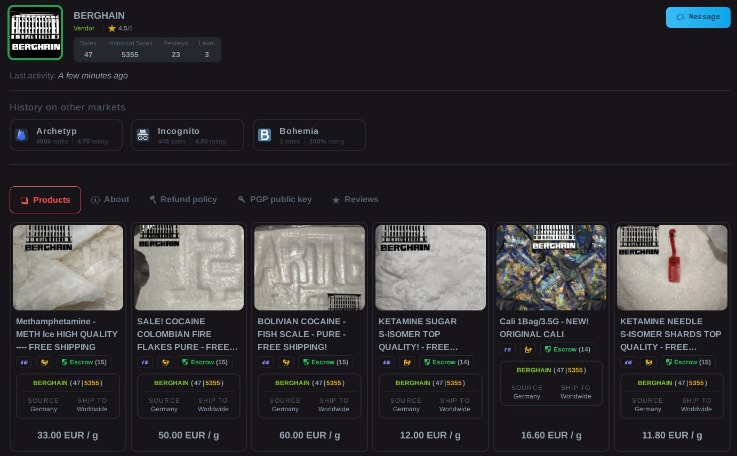
Understanding the layout and categories of darknet markets like Nexus can provide insight into how these platforms operate and how illicit marketplaces are structured. Despite their hidden nature, these marketplaces employ a systematic approach to product listings, mirroring legitimate ecommerce practices but within a clandestine environment geared towards unlawful exchanges.
Pricing and Payment Methods
The nexus market darknet is a complex and often clandestine marketplace where various products and services are traded outside the purview of traditional financial systems and regulatory oversight. With a focus on anonymity and security, it caters to a wide range of categories, each with distinct listings and operational protocols. Market listings in such environments are carefully curated and typically organized into specific product categories to facilitate user navigation and transaction efficiency. These categories might include digital goods, pharmaceuticals, counterfeit documents, technologies, and other illicit commodities. Ensuring accurate classification helps buyers find what they need quickly while maintaining operational secrecy.
Product categories on darknet markets like the nexus market darknet are designed to segment offerings into recognizable groups, enabling streamlined browsing and search functionality. Sellers are generally required to specify detailed descriptions, pricing, and other pertinent information, which users rely on to make informed decisions. Categories are often subdivided further to manage the diverse range of products, making it easier for buyers to locate specialized items without exposing too much personal data or transaction history.
Pricing strategies on these markets can vary significantly based on the product category, demand, seller reputation, and perceived risk. Prices are usually listed in cryptocurrencies such as Bitcoin, offering a level of financial privacy. Negotiation might occur through messaging systems, and some sellers set fixed prices while others prefer auction or bidding methods. Transparency about pricing is crucial for building trust within the marketplace, especially in environments like the nexus market darknet, where authenticity and reliability can be harder to verify. Payment methods are primarily digital, leveraging cryptocurrency to maintain anonymity and security throughout the transaction process. Buyers and sellers often utilize escrow services to reduce risk and ensure that both parties fulfill their obligations.
Overall, the organization of market listings, product categories, pricing, and payment methods plays a vital role in facilitating secure and efficient trade within the nexus market darknet. Despite the clandestine nature of these platforms, adhering to structured practices helps promote smoother transactions and better user experiences while maintaining the necessary secrecy for all parties involved.
Security and Anonymity Measures
In the digital age, ensuring security and maintaining anonymity are essential aspects of navigating online environments, especially within the context of the darknet. Users seeking privacy often adopt various measures to protect their identities and secure their communications. These protective strategies are particularly important when accessing marketplaces like nexus market darknet, which operates within the clandestine portions of the internet. By leveraging advanced encryption techniques, using secure connections, and employing anonymity tools, individuals can mitigate the risks associated with illegal activities or sensitive transactions.
Encryption and Privacy Protocols
Security and anonymity are fundamental concerns for users operating within the darknet, especially on platforms like Nexus Market darknet. Ensuring that transactions and communications remain private requires robust encryption and privacy protocols that safeguard user identities from potential surveillance or interception. In these environments, layers of security are employed to create a trustless system where both vendors and buyers can interact with confidence.
Encryption plays a vital role in protecting sensitive data, utilizing advanced cryptographic techniques to secure communication channels and transaction details. Secure messaging protocols ensure that information exchanged between parties cannot be intercepted or deciphered by unauthorized entities. Additionally, transaction privacy is often enhanced through the use of coin mixing services and privacy-focused cryptocurrencies, which obscure transaction origins and destinations, making tracing extremely difficult.
Privacy protocols also include the use of VPNs and anonymizing networks such as Tor, which help conceal user IP addresses and location data. These tools add layers of anonymity that prevent third parties from identifying individual users or tracking their activities. Strict operational security practices are recommended for anyone engaging in the darknet marketplace to minimize exposure and protect personal information from potential breaches.
Overall, Nexus Market darknet emphasizes the importance of combining encryption and privacy measures to maintain a secure trading environment. As threats evolve, continuous improvements in security protocols, including multi-layer encryption, secure wallet management, and vigilant operational practices, remain essential to sustain user trust and uphold the integrity of transactions within the darknet community.
Operational Security (OpSec) Practices
Ensuring security and maintaining anonymity are critical components when operating within darknet marketplaces such as Nexus Market Darknet. These measures help protect users from potential legal repercussions, theft, or infiltration by malicious actors. Implementing robust operational security (OpSec) practices is essential for safeguarding personal information, transaction details, and overall identity in this clandestine environment.
Effective security and OpSec practices for darknet users include a combination of technical measures and careful operational procedures. Adopting these strategies helps maintain privacy and reduce exposure to cyber threats or law enforcement investigations.
- Use of strong, unique passwords and end-to-end encryption tools to protect sensitive communications and account information.
- Accessing the marketplace exclusively through secure browsers like Tor to ensure anonymity and hide your IP address from third-party observers.
- Regularly updating software, browser plugins, and security features to patch vulnerabilities that could be exploited by attackers.
- Implementing separate operational identities and avoiding reuse of pseudonyms or cryptographic keys across multiple platforms or transactions.
- Using virtual private networks (VPNs) in conjunction with Tor to add additional layers of privacy, while being cautious about VPN trustworthiness.
- Careful management of digital footprints, including avoiding linking personal information or identifiable behaviors to the marketplace accounts.
- Engaging in discreet communication practices, such as using encrypted messaging services and avoiding sharing unnecessary personal details.
- Conducting transactions and interactions with a focus on minimal data exposure, and avoiding patterns that could be traced back to real-world identities.
When navigating platforms like Nexus Market Darknet, maintaining strong security and anonymity practices is indispensable. These measures protect users from potential vulnerabilities and help ensure a safer experience within the complexities of the darknet environment. Continuous vigilance and adherence to good OpSec principles are essential for preserving privacy and avoiding legal or cyber threats in this clandestine realm.
Law Enforcement and Legal Challenges
Law enforcement agencies around the world face significant legal challenges when tackling illicit activities on the darknet. The anonymity provided by technologies such as Tor makes it difficult to trace transactions and identify individuals involved in illegal marketplaces. One notable example is the nexus market darknet, a platform known for facilitating illegal trade, which has drawn attention from authorities aiming to combat cybercrime. Navigating the complex legal landscape requires specialized strategies to effectively investigate and dismantle these hidden marketplaces. For those interested in understanding more about the nexus market darknet, there are resources available that offer insights into its structure and operations, such as the detailed information found at the nexus market darknet. Addressing these challenges is critical for maintaining security and upholding the rule of law in digital spaces.
Past Investigations and Seizures
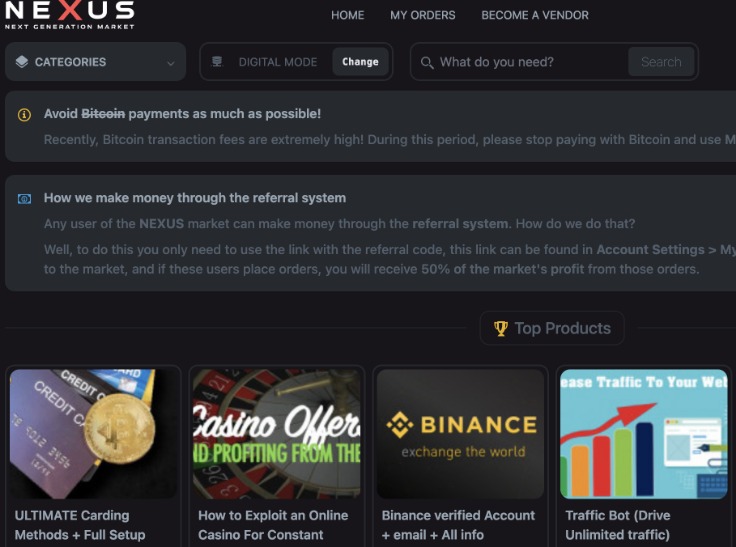
Law enforcement agencies around the world have faced significant challenges in regulating and controlling activities related to the darknet, particularly with the emergence of marketplaces like the nexus market darknet. These clandestine platforms facilitate the anonymous exchange of illegal goods and services, posing complex legal and security issues. Investigations often require sophisticated techniques to trace transactions and identify operators without compromising the privacy and anonymity that are central to the darknet’s structure.
Past investigations into darknet marketplaces have led to high-profile seizures and arrests. Authorities have employed a range of methods, including deep digital forensics, undercover operations, and international cooperation, to dismantle criminal networks operating on these clandestine platforms. Seizures typically involve confiscating servers, freezing digital assets, and collecting evidence to build criminal cases. These operations highlight the ongoing effort to combat illicit trade while respecting privacy rights and adhering to legal standards.
Legal challenges in this arena are substantial, as jurisdictions grapple with balancing the need for enforcement with the protections of digital privacy. Prosecuting crimes linked to the nexus market darknet often involves complex questions about jurisdiction, digital evidence admissibility, and the legal limits of surveillance. Despite these hurdles, law enforcement continues to adapt and develop new strategies to combat illegal activities on the darknet, aiming to disrupt criminal operations while safeguarding legal boundaries. Ongoing investigations remain crucial in addressing the evolving landscape of darknet marketplaces and their impact on global security and law enforcement efforts.
Challenges in Monitoring Nexus Market
The Nexus Market darknet has emerged as a significant hub for illicit activities, posing substantial challenges for law enforcement agencies worldwide. Its decentralized and encrypted nature makes surveillance and monitoring efforts particularly difficult, allowing vendors and buyers to operate with a degree of anonymity that complicates traditional investigative techniques. The growing volume of transactions and the diversity of illegal goods traded on such platforms further hinder efforts to track and dismantle these networks.
Law enforcement agencies face numerous legal challenges when attempting to intervene in these digital black markets. Jurisdictional issues often arise due to the global reach of the darknet, complicating coordination between different countries’ authorities. Additionally, the legal frameworks for online investigations may vary, creating hurdles in gathering admissible evidence for prosecution. Privacy protections and encryption technologies employed by users also restrict access to critical data needed to identify and apprehend offenders.
Monitoring the nexus market on the darknet requires specialized technical skills and resources. Authorities need to develop advanced tools capable of penetrating encrypted communications and analyzing complex blockchain transactions. Yet, even with these capabilities, the constantly changing landscape and the use of anonymization services challenge sustained surveillance efforts. The delicate balance between ensuring effective enforcement and respecting legal rights continues to be a focal point in addressing the threats posed by darknet markets.
Overall, combating illegal activities on the Nexus Market darknet and similar platforms demands a coordinated approach that integrates legal action, technological innovation, and international collaboration to overcome the persistent challenges in monitoring and enforcement.
Risks and Limitations for Users
Engaging with the nexus market darknet presents a range of risks and limitations that users should carefully consider. Due to the anonymous and unregulated nature of these markets, individuals may face significant security threats such as scams, hacking, or exposure of personal information. Additionally, the legality surrounding darknet activities varies across jurisdictions, making it crucial to understand regional laws before participation. Users should also acknowledge the potential for encountering counterfeit products or malicious content, which can lead to financial loss or legal repercussions. It is important to proceed with caution and conduct thorough research to mitigate these risks and understand the inherent vulnerabilities involved in utilizing the nexus market darknet.
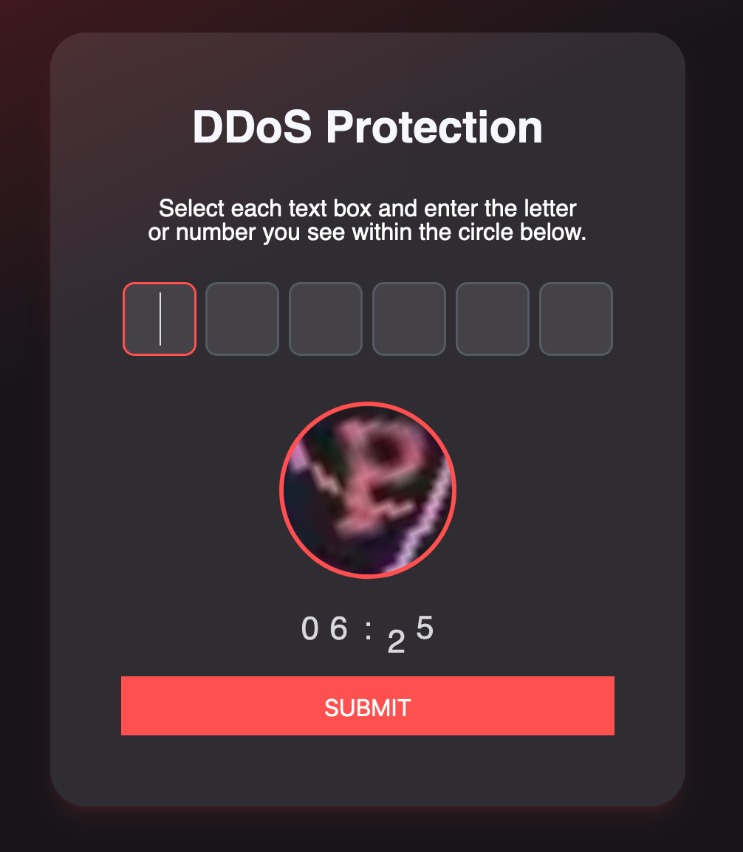
Potential for Fraud and Scams
Engaging with darknet marketplaces such as Nexus Market Darknet involves significant risks and limitations for users, primarily due to the inherently unregulated and often illegal nature of these platforms. Participants may encounter difficulties in verifying the legitimacy of sellers or the quality of goods and services offered, increasing the likelihood of receiving counterfeit or substandard items. Moreover, the anonymity intended to protect users can also facilitate malicious activities, making it challenging to hold fraudulent parties accountable.
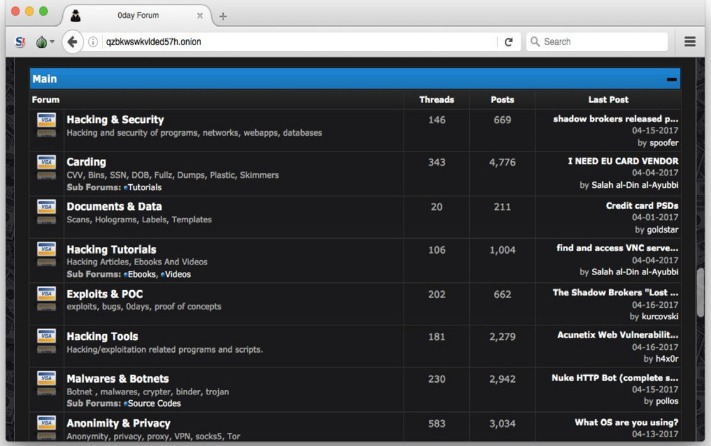
One of the primary concerns associated with darknet marketplaces is the potential for fraud and scams. Scammers often exploit the lack of oversight by creating fake listings or withdrawing payments after receiving orders. Users might also face the risk of their personal information being compromised, which can lead to identity theft or other malicious activities. Additionally, law enforcement agencies monitor these platforms closely, and involvement in illegal transactions can result in severe legal consequences, including criminal charges and imprisonment.
Limitations also include the unpredictable nature of the marketplace environment, with frequent site takedowns, exit scams by administrators, and the constant emergence of new platforms. These factors contribute to a high level of instability and unpredictability for users. As a result, individuals should be aware of these risks and exercise caution, understanding that participation in such environments involves considerable danger, both legally and financially.
Impact of Law Enforcement Actions

Engaging with the nexus market darknet involves significant risks and limitations for users, particularly in the context of legal and safety concerns. Due to the clandestine nature of these marketplaces, users often face uncertain legal repercussions and compromised security measures. Law enforcement agencies maintain constant vigilance over darknet activities, and their actions can rapidly impact users operating within these hidden networks. Understanding these risks is essential to mitigating potential adverse outcomes associated with accessing or participating in the nexus market darknet.
- Legal consequences: Accessing or purchasing illegal items on darknet marketplaces can lead to criminal charges, investigations, and costly legal battles.
- Security threats: Users risk malware, scams, and data theft that can compromise personal information and financial assets.
- Market volatility: The nexus market darknet is subject to shutdowns, takedown operations, and law enforcement disruptions, which can result in loss of funds or inability to access purchased goods.
- Traceability risks: Despite efforts to anonymize transactions, law enforcement agencies employ sophisticated techniques to trace illicit activities, increasing the likelihood of detection.
- Financial limitations: Many darknet transactions require cryptocurrencies that may be difficult to trace but are also volatile and may be confiscated or lost during interdictions.
- Ethical and safety concerns: Engaging with such marketplaces risks contributing to illegal trade, which can harm individuals and communities, and exposes users to fraudulent schemes.
Furthermore, the nexus market darknet exemplifies the hazards that users face when operating within these hidden economies. Law enforcement actions can lead to the seizure of assets, shutdowns of marketplaces, and criminal investigations that extend beyond individual participants. Users must consider these risks carefully, as the repercussions often extend beyond financial loss to include legal and personal safety threats. Awareness of the limitations and potential impacts of law enforcement interventions is essential for anyone involved in darknet activities to make informed decisions and protect their interests.
Market Escalation and Evolution
The landscape of online marketplaces has experienced significant escalation and evolution over recent years, particularly with the emergence of darknet markets. These digital environments provide a platform for a variety of transactions that often operate outside the bounds of traditional regulation. The nexus market darknet, a prominent example within this sphere, exemplifies how these markets continue to adapt and expand, reflecting broader shifts in digital commerce and security concerns. As these markets evolve, they also pose complex challenges for law enforcement and cybersecurity professionals seeking to understand and regulate such clandestine economies. Exploring the development of the nexus market darknet reveals insights into the changing nature of anonymity and trade in the digital age.
Emergent Threats and Vulnerabilities
The nexus market darknet represents a complex and rapidly evolving segment within the broader realm of online illicit trade. As technology advances, this marketplace continuously adapts to emerging threats and vulnerabilities, posing significant challenges to law enforcement agencies and cybersecurity professionals alike. The dynamic nature of the darknet facilitates anonymity and decentralization, enabling a proliferation of illegal activities such as drug trafficking, illegal weapons sales, and identity theft. Over time, threat actors have refined their tactics, employing sophisticated encryption methods and evasive techniques to escape detection and prosecution.
Market escalation within the darknet, particularly in platforms like the nexus market, is driven by both increasing demand for illicit goods and the shifting landscape of cyber threats. Vulnerabilities in anonymity networks and security protocols often provide opportunities for malicious actors to exploit weaknesses, leading to cyberattacks, scams, and data breaches. As the ecosystem evolves, emergent threats include the rise of malware, phishing schemes, and sophisticated scams designed to deceive users and facilitate criminal operations. This constant evolution necessitates robust monitoring, continuous updates to security frameworks, and a proactive approach to identifying and mitigating vulnerabilities.
The nexus market darknet exemplifies how illicit markets can escalate in complexity and resilience, adapting swiftly to enforcement efforts and technological changes. As these markets evolve, they pose significant risks not only to individual users but also to global cybersecurity infrastructure. Staying ahead of emergent threats requires ongoing vigilance, collaboration across law enforcement agencies, and advancements in threat detection technologies to disrupt these clandestine networks effectively.
Comparison with Other Darknet Markets

The landscape of darknet markets has undergone significant transformation over the years, marked by continuous escalation and evolution. One notable platform in this ongoing development is the nexus market darknet, which has gained attention for its features and user experience. As darknet markets adapt to increasing security measures and law enforcement pressures, they also innovate in response to user demands for better privacy, faster transactions, and wider product offerings. These changes reflect the dynamic and competitive nature of the underground marketplace environment.
Compared to other darknet markets, nexus market darknet positions itself with a focus on enhanced security protocols and streamlined interface, aiming to attract a broader user base. Many older platforms have struggled to adapt to new technological standards or have faced shutdowns due to law enforcement crackdowns, leading to a constant cycle of rise and fall among darknet marketplaces. In contrast, nexus market has implemented more robust escrow systems and dispute resolution mechanisms to foster trust among users. This evolutionary shift demonstrates how darknet markets are not static but are continuously innovating to maintain relevance and operational resilience in an increasingly monitored digital space.
The comparison highlights that while traditional darknet markets often rely on anonymity and basic transaction methods, newer entrants like nexus market darknet are pushing the boundaries with more sophisticated security features. The persistent evolution of these markets underscores the importance of adaptation in an environment fraught with legal risks and technological challenges. As the darknet market ecosystem evolves, understanding these differences helps to illustrate the ongoing escalation in complexity, security, and user-centric features that define the modern underground marketplace.
